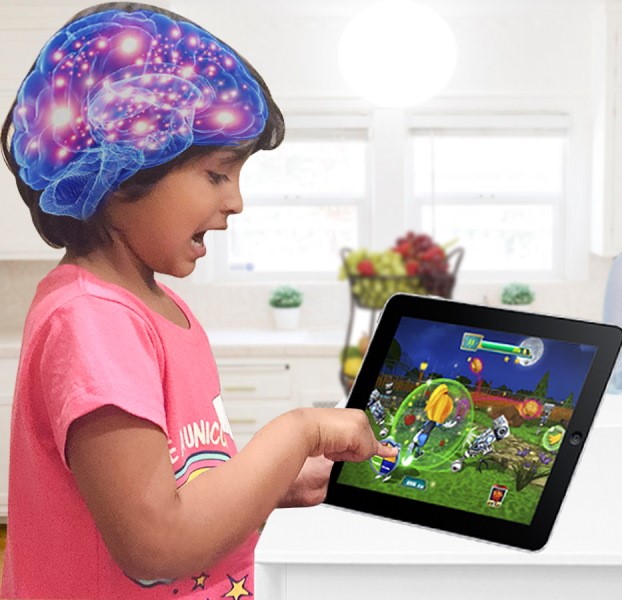Digital vaccines represent a novel approach to inducing sustained behavior changes through neurocognitive training targeting the reward and self-control regions of the brain at a neurosystems level. These interventions, aim to lower the risk of various diseases by promoting immunological memory and fostering positive health-related behaviors in children.
Our research focuses on validating and exploring health interventions for disease prevention using technology, supported by a robust body of evidence and rigorous scientific methods.
Emerging Health Concerns & Rising Need for Digital Vaccines
3.1 Million
under 5 child deaths annually are caused by malnutrition
39 Million
children under the age 5 were reported obese or overweight in 2020
0.652 Million
children are reported to be with type-1 diabetes as of 2021
80%
of world adolescent population don't meet required physical activity levels
 Obesity Prevalence in the United States
Obesity Prevalence in the United States
- The US obesity prevalence was 41.9% from 2017 to March 2020 (NHANES, 2021).
- Diabetes is the 8th leading cause of death in the United States.
- Approximately 11.3% of the US population has been diagnosed with diabetes.
- Alarmingly, 23.0% of the population remains undiagnosed.
- One-fifth (20%) of children had at least 1 chronic illness, with 8.5% having ≥2 chronic illnesses. Chronic diseases, are the major cause of deaths in the United States and are linked to lifestyle habits.
 Obesity Prevalence
Obesity Prevalence
- The prevalence of obesity in India stands at 40.3%.
- This rising trend in obesity is contributing to increasing rates of diabetes and other chronic diseases in the country.
- India ranks 2nd globally in the diabetes epidemic.
- Over 100 million individuals in India have been diagnosed with diabetes, earning the country the title of the "diabetic capital of the world."
- A concerning statistic is that nearly 31 million new diabetes cases were recorded between 2019 and 2021 (Source: India logs 31 million cases, Hindu, 2023).
- According to the World Health Organization (WHO), about 50 million children under the age of 5 in India have at least one chronic condition, which might include conditions such as Asthma, Malnutrition, Mental Health disorders, Chronic kidney disease and Diabetes.
Design of Digital Vaccines
 The design of digital vaccines centers around the development of engaging and interactive digital games, primarily on mobile platforms, specifically tailored to promote behavior change. These games incorporate elements of gamification, rewards, and challenges to enhance motivation and engagement. The games are personalized, taking into account individual factors such as age, preferences, and health conditions, to optimize their effectiveness. Additionally, implicit learning components are integrated, embedding crucial health information and habits within the gameplay mechanics. This design aims to create a fun and enjoyable experience while subtly promoting healthier choices and lifestyle habits in children.
The design of digital vaccines centers around the development of engaging and interactive digital games, primarily on mobile platforms, specifically tailored to promote behavior change. These games incorporate elements of gamification, rewards, and challenges to enhance motivation and engagement. The games are personalized, taking into account individual factors such as age, preferences, and health conditions, to optimize their effectiveness. Additionally, implicit learning components are integrated, embedding crucial health information and habits within the gameplay mechanics. This design aims to create a fun and enjoyable experience while subtly promoting healthier choices and lifestyle habits in children.
Working Mechanism
The working mechanism of digital vaccines relies on neurobehavioral modulation through neurocognitive training and sustained behavior change at a neurosystems level. The games are designed to target specific reward and self-control regions of the brain, such as the nucleus accumbens and the prefrontal cortex, which are involved in decision-making, motivation and self-control. By engaging these brain regions, the digital vaccines aim to establish long-lasting habits and reduction of chronic diseases arising due to lifestyle.Positive reinforcement is established through rewards in the game, which helps to strengthen the neural pathways associated with healthy behaviors. Game telemetry data is collected during gameplay, capturing players' choices, progress, and behaviors within the game. Researchers utilize this data and conduct rigorous evaluations, including near-term and longitudinal impact studies, to assess the intervention's effectiveness. Rigorous evaluation methods and data analysis ensure the scientific validation and evidence-based nature of these interventions, making them a promising avenue for disease prevention through technology.



